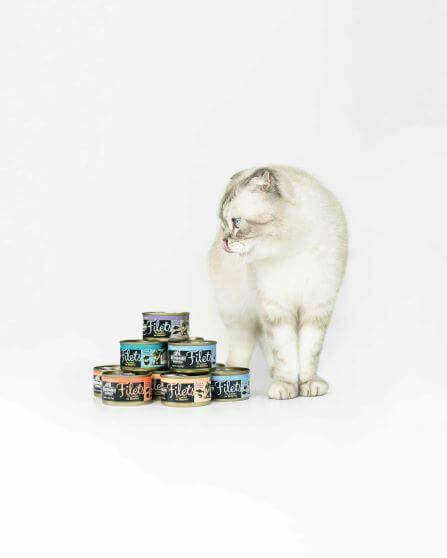
Kitten-Proofing 101: The Ultimate Checklist of New Kitten Must-Haves
There’s nothing quite as blissful as the soothing purr of a kitten as she kneads your chest and doses off into blissful repose. But your relaxation can be quickly stymied if it’s followed by a swat at your face with sharp claws or the ceaseless bite of a kitten who’s had enough teething to last a lifetime. The right supplies can help you avoid common cat behavior problems, deepen your relationship with your new family member, and ensure your new kitten transitions seamlessly from her mother or the animal shelter and into your family.
The Right Food for Your New Kitten’s Great Start
Good nutrition is the foundation from which everything else about your cat’s well-being springs forth. Cats are obligate carnivores, which means that vegetarian foods and diets rich in grains and veggies are terrible for your new kitten’s health. Instead, carefully review the ingredients in the food you choose to ensure that the first ingredient is meat. Cat foods list ingredients by weight, from most to least prevalent. The ideal kitten food is about 30% protein and no more than 20% fat. Remember to get these critical feeding supplies:
- A sturdy water bowl and food dish; stainless steel is easy to clean and less likely to harbor bacteria and viruses.
- A water bowl and food dish you can attach to your new kitten’s crate if you choose to crate her, as well as travel feeders if you find yourself traveling with your feline friend a lot
- Kitten food (Redbarn recommends wet food, like our grain-free canned food)
- Optional: a feline fountain can keep your new kitten’s mind occupied, and is great for keeping her busy if she becomes destructive.
- Optional: Kitten supplements. A high-quality kitten food makes supplementation unnecessary, but some owners feel more confident when they give their kittens a multivitamin.
Playtime, Learning Time
Kittens, like other animals, primarily learn through play. The right toys help your new kitten find an appropriate outlet for her aggression, tire her out so she can sleep through the night, and help you bond. Consider some of the following:
- A laser pointer
- A stuffed mouse or another animal
- Catnip, or catnip-stuffed toys
- Interactive toys such as small balls
- A feather on a stick. These tease toys keep your new kitten’s mind occupied while helping her master impulse control.
Keeping Busy Mouths and Paws Occupied
Kittens love to explore their world, but they often do so with their mouths. Add the pain of teething into the mix, and you’ve got a crazed ball of fur gnawing on just about everything—furniture, hands, faces, other animals. To minimize teething pain and help your cat avoid destroying furniture by scratching or chewing on it, be sure to get the following supplies:
- A scratching post that your cat can easily access
- A kitten tree if your cat loves jumping and climbing curtains and other inappropriate surfaces
- Kitten chew toys
- Stuffable toys, such as Kong teething toys. Stuffing these toys with treats encourages your kitty to chew on them, not you or your furniture
Accident Prevention and Cleanup
Cats are relatively clean animals, and they rarely soil the area where they sleep. Consequently, crate-training is one of the very best things you can do to prevent accidents, especially before your cat masters the use of the litter box. Some must-have cleanup and litter training supplies include:
- At least one litter box. If your house is large or has multiple levels, consider getting, at least, two litter boxes for each level of your home. Shy cats often embrace enclosed litter boxes, so consider trying a couple of different varieties until you settle on one your cat likes and uses.
- A litter scoop that fits comfortably into your hand
- Cat litter. You may have to experiment with several brands until you find one that you like.
- Kitten or puppy pads for when you must contain your new kitten and are worried he might have an accident
- Odor-neutralizing carpet cleaner. Kittens are creatures of habit, and if an area smells like urine or feces, they’re more likely to go there. Minimize the risk of repeat accidents by cleaning up any and all accidents with an odor-neutralizing spray.
- Optional: A pet cleanup steam cleaner such as a spot bot
Grooming Supplies
Keeping your new kitten clean doesn’t just make her more fun to pet. It can also help her avoid itchy fur and damaged skin. Talk to your vet about how frequently to groom or bathe your kitten, since excessive baths can harm your kitten’s delicate skin. Some items to consider include:
- Soft Paws to keep scratches from your kitten playful, not painful. Most cat experts consider declawing inhumane and painful.
- A wire brush
- A slicker brush
- A metal-toothed comb
- Nail trimmers and styptic powder to stop any bleeding due to excessive nail cutting
- Hypoallergenic kitten shampoo and conditioner; kittens do not need frequent baths, but by bathing your kitten while she’s still young, you increase the likelihood that she’ll tolerate baths in adulthood.
Maintaining Excellent Health
Every new kitten needs a trip to the vet to discuss health concerns, set a timeline for spaying or neutering your pet, and determining which vaccines are appropriate. Your vet is like a one-stop-shop for all things cat health and behavior-related, so don’t be afraid to pepper her with questions. That’s why she’s there! Some issues to discuss with your vet include:
- Heartworm preventative treatment
- Flea and tick preventative treatment
- Testing your kitten for parasites
- Which vaccines are appropriate for your kitten’s age, location, and lifestyle
- Whether microchipping is appropriate and safe for your kitten
Containing Your New Kitten
Leashes aren’t just for dogs! Cats can be trained to walk on a lead, too, so consider leash-training your kitten from the very beginning of her life. Not sure about leash training? You’ll still need to contain your furry companion when you’re out and about, so be sure to gather the following supplies:
- A sufficiently large crate for travel, containment, and sleeping
- A bed or soft pillow to put in the crate, or for your cat to luxuriate on during nap time
- A harness appropriate for your cat’s size
- A leash
- A collar and tags. Even if your cat lives indoors, she should always wear her tags since many cats are escape artists
The first few months with your kitten determine much about her future personality, so don’t neglect the basics: lots of love and socialization, some basic training, and superior medical care. It can be overwhelming to get everything you need, but once you have it, you’ll be ready for just about anything.
Do you have a question about our canned food or any other Redbarn product? Call (800) 775-3849 between 8 a.m. and 5 p.m. PST, Monday through Friday to speak with one of our friendly customer service agents!
All data and information provided on this site is for informational purposes only and reflect the views of the authors alone, and do not necessarily reflect those of the organization. Redbarn.com makes no representations as to accuracy, completeness, timeliness, suitability, or validity of any information on this site and will not be liable for any errors, omissions, or delays in this information or any losses, injuries, or damages arising from its display or use. All information is provided on an as-is basis. Please note that each situation is different, and you should always consult your veterinarian should you have any questions about your pet’s health.


